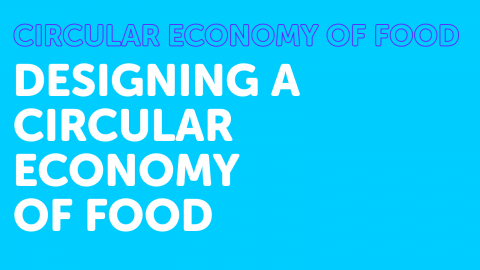Designing a Circular Economy of Food – Live with Ellen MacArthur Foundation & Google


00.00 – Introduction Emma Chow & Mike Werner
12.45 – Which role do Google and the TFF Digital Labs play a role in fostering cross-country collaboration?
Google recently announced a new feature within Google Assistant in partnership with Earth 91 that enables you to make better recycling decisions in North America. This is a great way to show how Google uses its platform to democratize the impact of information and make it relevant.
15.45 – What is the circular economy and how is it different from circularity?
Three core principles underpin the circular economy:
- Design out waste and pollution
- Keeping materials and products in use at their highest value for as long as possible
- Regenerating natural systems
💡 Circularity can mean only the circularity of a material stream, recycling or a circular product.

18.45 – Can you give us some really practical tips and tricks that can simplify applying the concept of the circular economy?
Emma: It helps to look at the full food journey from farm to production level: How are the ingredients being grown? Are there opportunities to reimagine that at the farm level? Are you creating waste along the way, that actually isn’t waste at all?
Measuring the circular economy
22.06 – What role might science and technology play in moving us towards circular economy approaches?
Mike: The idea of the circular economy is that we learn from nature. It has evolved over billions of years to cycle nutrients endlessly. Science can e.g. help us come up with new innovations to package food in a safe, contamination-free and circular way, thereby enhancing what we can learn from nature.
Some of the projects Google supports:
The New Plastics Economy
Global Fishing Watch
Global Forest Watch
Project Sunroof
Environmental Insight Explorer
25.88 – What are some of the incentives for companies to apply circular economy principles and move towards new business models?
Emma:
- De-risk supply chains – Climate change issues deeply affect the predictability, consistency, and price of ingredients for good companies. A circular economy can mean more resilience and adaptability towards climate change.
- Meet new consumer values: Businesses can gain a competitive advantage if they provide products and offerings that adapt to changing consumer values and sustainability demands.
- Contribute to showcasing successes to investors: We need to get investors to funnel money to businesses that are applying circular principles.
34.50 – Can I submit to the Circular Economy Prize and the main Challenge prizes?
Yes, you can. When you submit your pitch you’ll have the chance to submit for one of the topical prizes in addition to the TFF prizes.
36.10 – Why do you think the TFF Challenge is important and what’s your vision for it?
“Large traditional corporations struggle to advance novel and amazing change in the world. They reach this point in their evolution where they are strictly focused on consistency, predictability, and uniformity and that drives out a lot of the unpredictable nature of innovation. Innovation is a process of change and it is precisely why innovation challenges are essential. I’m so excited about the TFF Challenge because you all can inspire us to think about what we could do in the future.” – Mike Werner
“We’ll be at leading food conferences next year, and one of my goals is that there are multiple iconic solutions coming out of the TFF Challenge that we can hold up on stage as these guiding lights. Moreover, this puts pressure on the slow-to-adapt big food industry players.” – Emma Chow
49.10 – Do we need to have a business model canvas and read a description of the business model for these solutions?
Mike: The focus, from a business perspective, is on quantitative value, such as financials and performance. Still, there are qualitative forms of value that end up creating stickier, more experienced, and emotional value.
53.22 – Developing eco-friendly and climate-friendly products is the most times a cost-intensive one. How do we incorporate the circular economy principles and still have a competitive edge over other industry players and competitors? How do we offset these costs and produce quality at a competitive price?
You may not be able to compete at the lowest price point. However, creating an experience that is emotionally connected and hits on the identity of people might have even more impact. Your solution may not appear ideal to the masses, you may be appealing toward a particular segment that really cares about what you do. While it might not be the highest performing product or most cost-competitive product, it delivers an experience that resonates with people.
57.00 – Takeaways
Circular Economy is all about redesigning and leaning into that ambiguity and complexity. Inspire your peers and the big food players out there.
Try to really create models that address that human engagement element to drive impact and bring your product or service to life. You need to people need to understand your narrative. You are unconstrained by a lot of the conventions within a normal large company, embrace that. It might be uncomfortable, you may not have access to the right resources or the right information. Yet through the TFF Challenge, you will be part of a network that can bridge those gaps and create this open sharing community.
TFF is a platform for experimenting with new models for the future, to embrace complexity to the aberrations, to try, test, fail, share and repeat.
Thank you to our guests, Emma from Ellen MacArthur and Mike from Google, for taking the time to inspire us and provide really practical insights to our global innovator community.
TFF Challenge
Sign up and pitch by January 31st, 2020!
Enjoy more live sessions like this one by signing up for the TFF Challenge on the TFF Digital Labs.